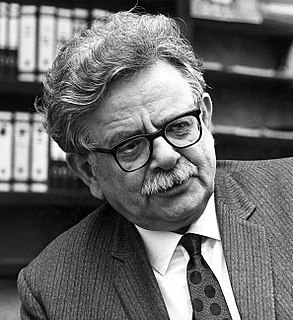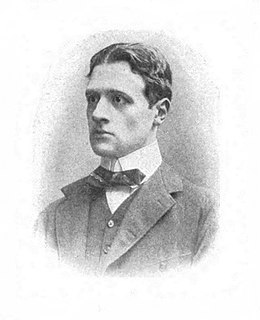A Quote by Elias Canetti
There is no doubt: the study of man is just beginning, at the same time that his end is in sight
Related Quotes
Man no longer lives in the beginning--he has lost the beginning. Now he finds he is in the middle, knowing neither the end nor the beginning, and yet knowing that he is in the middle, coming from the beginning and going towards the end. He sees that his life is determined by these two facets, of which he knows only that he does not know them
The beginning is never the clear, precise end of a thread, the beginning is a long, painfully slow process that requires time and patience in order to find out in which direction it is heading, a process that feels its way along the path ahead like a blind man the beginning is just the beginning, what came before is nigh on worthless.
The refining influence is the study of art, which is the science of beauty; and I find that every man values every scrap of knowledge in art, every observation of his own in it, every hint he has caught from another. For the laws of beauty are the beauty of beauty, and give the mind the same or a higher joy than the sight of it gives the senses. The study of art is of high value to the growth of the intellect.
If Montaigne is a man in the prime of life sitting in his study on a warm morning and putting down the sum of his experience in his rich, sinewy prose, then Pascal is that same man lying awake in the small hours of the night when death seems very close and every thought is heightened by the apprehension that it may be his last.
Like every man who appears at an epoch which is historical and rendered famous by his works, Jesus Christ has a history, a history which the church and the world possess, and which, surrounded by countless memorials, has at least the same authenticity as any other history formed in the same countries, amidst the same peoples and in the same times. As, then, if I would study the lives of Brutus and Cassius, I should calmly open Plutarch, I open the Gospel to study Jesus Christ, and I do so with the same composure.
Bears are made of the same dust as we, and they breathe the same winds and drink of the same waters. A bear's days are warmed by the same sun, his dwellings are overdomed by the same blue sky, and his life turns and ebbs with heart pulsing like ours. He was poured from the same first fountain. And whether he at last goes to our stingy Heaven or not, he has terrestrial immortality. His life, not long, not short, knows no beginning , no ending. To him life unstinted, unplanned, is above the accidents of time, and his years, markless and boundless, equal eternity.
In endeavor itself there is a certain dynamic entertainment, affording an illusion of useful purpose. With achievement the illusion is dispelled. Man's greatest accomplishment is to produce change. The only good in life is study, because study is an endeavor that never reaches fulfillment. It busies a man to the end of his days, and it aims at the only true reality in all this world of shams and deceits.
And, she was able to tell herself with some satisfaction, the man in question - one Colin Bridgerton - felt precisely the same way.... ....His earth shook, his heart leaped, and Penelope knew without a doubt that his breath was taken away as well. For a good ten seconds. Falling off a horse tended to do that to a man.


































